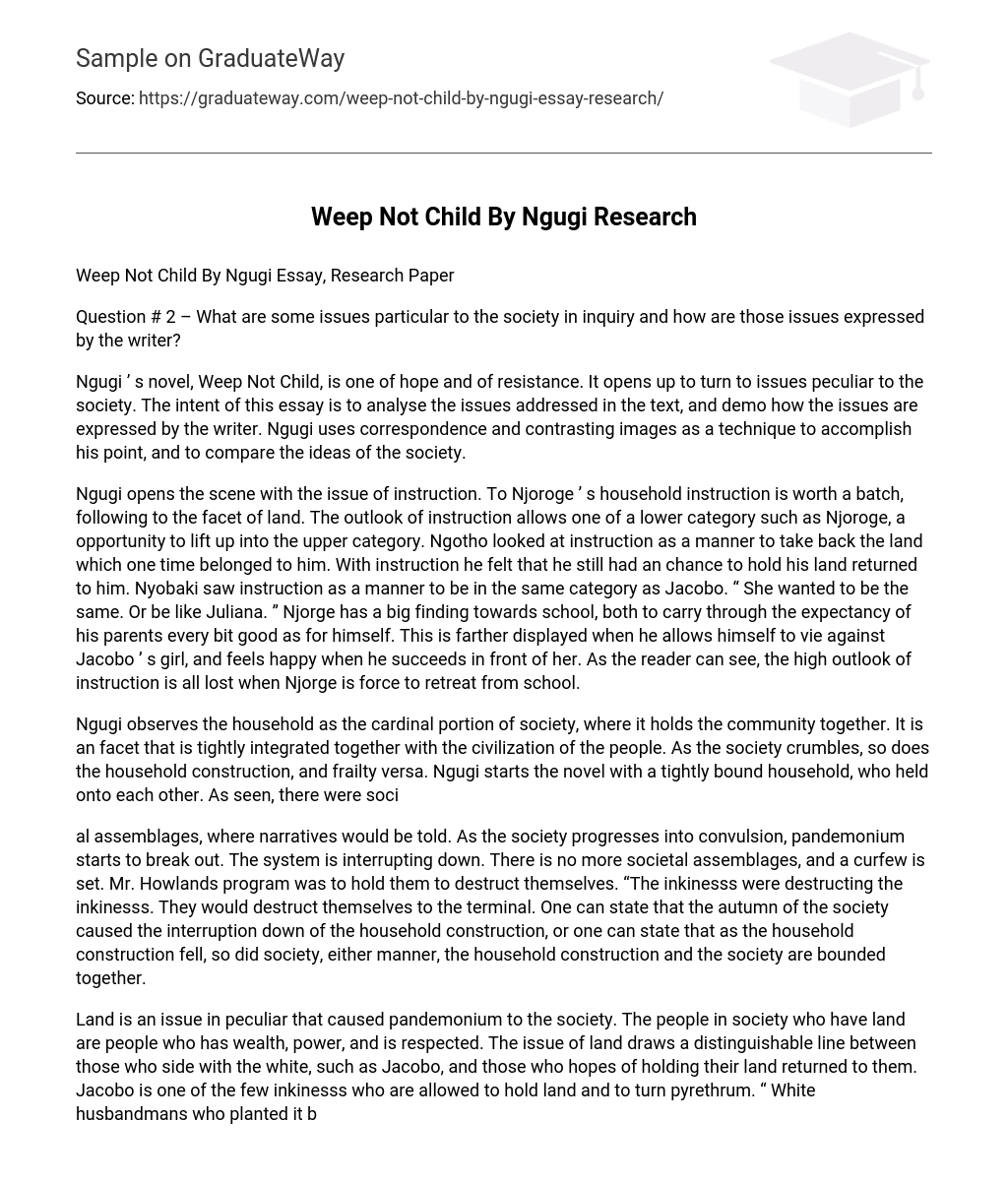Weep Not Child By Ngugi Essay, Research Paper
Question # 2 – What are some issues particular to the society in inquiry and how are those issues expressed by the writer?
Ngugi ’ s novel, Weep Not Child, is one of hope and of resistance. It opens up to turn to issues peculiar to the society. The intent of this essay is to analyse the issues addressed in the text, and demo how the issues are expressed by the writer. Ngugi uses correspondence and contrasting images as a technique to accomplish his point, and to compare the ideas of the society.
Ngugi opens the scene with the issue of instruction. To Njoroge ’ s household instruction is worth a batch, following to the facet of land. The outlook of instruction allows one of a lower category such as Njoroge, a opportunity to lift up into the upper category. Ngotho looked at instruction as a manner to take back the land which one time belonged to him. With instruction he felt that he still had an chance to hold his land returned to him. Nyobaki saw instruction as a manner to be in the same category as Jacobo. “ She wanted to be the same. Or be like Juliana. ” Njorge has a big finding towards school, both to carry through the expectancy of his parents every bit good as for himself. This is farther displayed when he allows himself to vie against Jacobo ’ s girl, and feels happy when he succeeds in front of her. As the reader can see, the high outlook of instruction is all lost when Njorge is force to retreat from school.
Ngugi observes the household as the cardinal portion of society, where it holds the community together. It is an facet that is tightly integrated together with the civilization of the people. As the society crumbles, so does the household construction, and frailty versa. Ngugi starts the novel with a tightly bound household, who held onto each other. As seen, there were soci
al assemblages, where narratives would be told. As the society progresses into convulsion, pandemonium starts to break out. The system is interrupting down. There is no more societal assemblages, and a curfew is set. Mr. Howlands program was to hold them to destruct themselves. “The inkinesss were destructing the inkinesss. They would destruct themselves to the terminal. One can state that the autumn of the society caused the interruption down of the household construction, or one can state that as the household construction fell, so did society, either manner, the household construction and the society are bounded together.
Land is an issue in peculiar that caused pandemonium to the society. The people in society who have land are people who has wealth, power, and is respected. The issue of land draws a distinguishable line between those who side with the white, such as Jacobo, and those who hopes of holding their land returned to them. Jacobo is one of the few inkinesss who are allowed to hold land and to turn pyrethrum. “ White husbandmans who planted it besides did non desire many Afrians to be allowed to turn any hard currency harvest because this would take down the criterions and quality of production. ” The issue of the land brings up racial tenseness. One can see the difference between a white adult male and a black. A black adult male is colored, and a white adult male has more high quality over the black, who took their justness off. The facet of the Indians can be binded into the issue of racial tenseness. It is dry how the Indians are besides colored, yet people treat them with more respect so to the inkinesss.
There are four chief issues addressed in the text that is asserted by the writer, the issue of instruction, household construction, land, and racial tenseness. Each issue is expressed by the writer in a disorganised manner. Ngugi composed Weep Not, Child in a upset manner to show how helter-skelter everything was by mingling the scenes.





